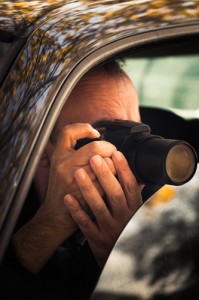Undercover Surveillance
 Undercover surveillance is a delicate field of work. When you require the delivery of information on a confidential level, it is paramount to align yourself with a private investigator who can conduct thorough and informative surveillance and also be prepared to produce results that are admissible in court should it be necessary. Properly running, documenting, and reporting surveillance intelligence is critical to the success of a private investigator, and the success of each client’s case. Being able to work fluidly with existing on-site security guards is of supreme benefit to any surveillance case.
Undercover surveillance is a delicate field of work. When you require the delivery of information on a confidential level, it is paramount to align yourself with a private investigator who can conduct thorough and informative surveillance and also be prepared to produce results that are admissible in court should it be necessary. Properly running, documenting, and reporting surveillance intelligence is critical to the success of a private investigator, and the success of each client’s case. Being able to work fluidly with existing on-site security guards is of supreme benefit to any surveillance case.
The Necessity of Undercover Surveillance
The very essence of undercover surveillance is to discreetly obtain factual evidence. Whether surveillance is conducted to prove a crime has been committed, gather evidence, document a person’s activities, identify a person’s location, prove contact between people, or to obtain intelligence, surveillance is a priceless tool. And the act of surveillance is a verifiable art.
Anyone can attempt to do surveillance, but only professionally trained and experienced private investigators are capable of conducting surveillance that is permissible in court or evidence for action. Coordinating surveillance goals with the work of security guards allows for an even greater level of intelligence gathering.
Motivation for Undercover Surveillance
An individual who wants surveillance conducted on a person or persons is eager for proof of something. Whether the evidence gathered shows inappropriate behavior – or appropriate behavior, as the case may be – having documented, legitimate information is invaluable.
Some of the most typical undercover surveillance cases conducted include:
- Investigating worker’s compensation claims
- Proving infidelity
- Pursuing a missing person
- Capturing acts of vandalism
- Tracking thieves
Common Types of Undercover Surveillance
Every surveillance case requires customized treatment, though the methods with which each case is approached may overlap somewhat. It is up to your private investigator to determine, based on the circumstances of the case and the desired outcome, how the investigation should proceed to produce the most thorough results.
Types of undercover surveillance can include:
- Covert: Covert investigations are hidden and undetected investigations. For example, legally using a GPS tracking device to trail a target’s vehicle, or trailing a target in person in a surreptitious manner.
- Overt: Overt surveillance should be the most discouraging kind of surveillance for thieves, trespassers, troublemakers, and the like. The presence of security guards and security cameras in shopping malls or other public places makes it clear to people that they are being watched.
- Stationary: Stationary surveillance takes place in one location only. In these situations, a private investigator may take a post in their car or at a public place to keep an eye on a particular area for activity.
- Mobile: A mobile undercover surveillance investigation is the following of a moving target. Whether a person is walking or driving from point A to point B, the investigator must follow along to track their movements at the start, finish, and in between to gather adequate evidence.
- Human: When you think of surveillance, human surveillance may be what most often comes to mind: A private investigator tailing a target or observing them in certain situations. For example, if a person is being tracked at the request of their spouse in an effort to prove infidelity, human surveillance is necessary to follow them from place to place and make note of their movements. Witness gathering and interviewing also requires human surveillance.
- Mechanical: For undercover surveillance cases that require the gathering of information from various locations at the same time, or for locations where the nature of the information being gathered is random and difficult to predict, technology comes in handy. A camera can track someone who is stealing repeatedly from a retailer. This use of technology reserves the energy of private investigators to conduct more up-to-the-minute work. Using mechanical surveillance in combination with stationing a security guard on-site can produce tremendously thorough and successful surveillance results.
Qualities of a Private Investigator
While it may seem like surveillance is something that you could carry out on your own to gather the information you desire, there are demands and challenges in undercover investigations that are better suited to experienced professionals. You may think you have the patience to sit in a freezing cold car all day in Michigan to gather the information you desperately desire, but patience is a virtue. And patience is a unique need of undercover investigators, along with great observation skills, an excellent memory, a focused mind, a flexible schedule, resourcefulness, a strong attention to detail, keen interviewing skills, and the ability to either blend in or stick out, as the case may be.
Undercover investigators are also intimately familiar with the legalities of surveillance investigations, particularly when it comes to trespassing, audio recording laws, and notifying law enforcement when necessary. Private investigators are licensed, bonded, and insured to carry out the work for which they have been trained and hired – leave the work to them and trust that the right private investigator in Michigan will get the results you need. Contact Korner Security for your undercover surveillance and security guard needs.
